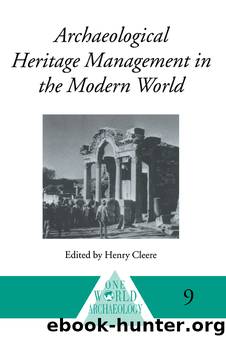Archaeological Heritage Management in the Modern World by Henry Cleere

Author:Henry Cleere [Cleere, Henry]
Language: eng
Format: epub
ISBN: 9780415214483
Barnesnoble:
Publisher: Taylor & Francis
Published: 1990-11-08T00:00:00+00:00
15 Heritage management and training in England
ANDREW SAUNDERS
Definitions
The phrase âcultural resource managementâ first registered on British ears at the Conference of the Society for American Archaeology at Dallas in 1975. Although in use, the phrase still does not come easily to English-speaking archaeologists on this side of the Atlantic, and certainly not to the ordinary person. Here the equivalent jargon expression is the âheritageâ.
We distinguish between the natural and the man-made heritage. By the latter we mean the built environment (sites, monuments and historic areas); that is, the surviving patterns of successive land use and settlement, whether domestic, ceremonial, funerary, economic or defensive, from prehistoric times onwards to include the recent past. With these archaeological survivals we include buildings of architectural and historic importance, and the townscape and street pattern of our historic towns. However, in Great Britain we also distinguish between the built environment and portable antiquities and works of art. These are administered separately in legislative and practical terms. They belong to the province of our national and local museums, public and private. These objects and their safekeeping lie mainly outside the scope of this chapter, although it will be seen that museum management is not irrelevant to our subject. The separation, however, of sites (buried archaeological remains, historic sites and earthworks) and monuments (standing structures, whether roofed, inhabited or ruined) from museums and the objects that they contain is a distinction which is also maintained internationally by Unesco. The International Council on Monuments and Sites (ICOMOS), whose parent body is Unesco, has its counterpart in the International Council for Museums (ICOM).
Download
This site does not store any files on its server. We only index and link to content provided by other sites. Please contact the content providers to delete copyright contents if any and email us, we'll remove relevant links or contents immediately.
Spell It Out by David Crystal(35849)
Life for Me Ain't Been No Crystal Stair by Susan Sheehan(35536)
Cecilia; Or, Memoirs of an Heiress — Volume 1 by Fanny Burney(32064)
Cecilia; Or, Memoirs of an Heiress — Volume 3 by Fanny Burney(31458)
Cecilia; Or, Memoirs of an Heiress — Volume 2 by Fanny Burney(31409)
The Great Music City by Andrea Baker(30784)
Professional Troublemaker by Luvvie Ajayi Jones(29422)
We're Going to Need More Wine by Gabrielle Union(18635)
Twilight of the Idols With the Antichrist and Ecce Homo by Friedrich Nietzsche(18303)
The Secret History by Donna Tartt(18168)
Cat's cradle by Kurt Vonnegut(14763)
All the Missing Girls by Megan Miranda(14748)
Pimp by Iceberg Slim(13781)
Bombshells: Glamour Girls of a Lifetime by Sullivan Steve(13687)
Fifty Shades Freed by E L James(12918)
Talking to Strangers by Malcolm Gladwell(12879)
Norse Mythology by Gaiman Neil(12836)
The Social Justice Warrior Handbook by Lisa De Pasquale(11956)
Underground: A Human History of the Worlds Beneath Our Feet by Will Hunt(11840)
